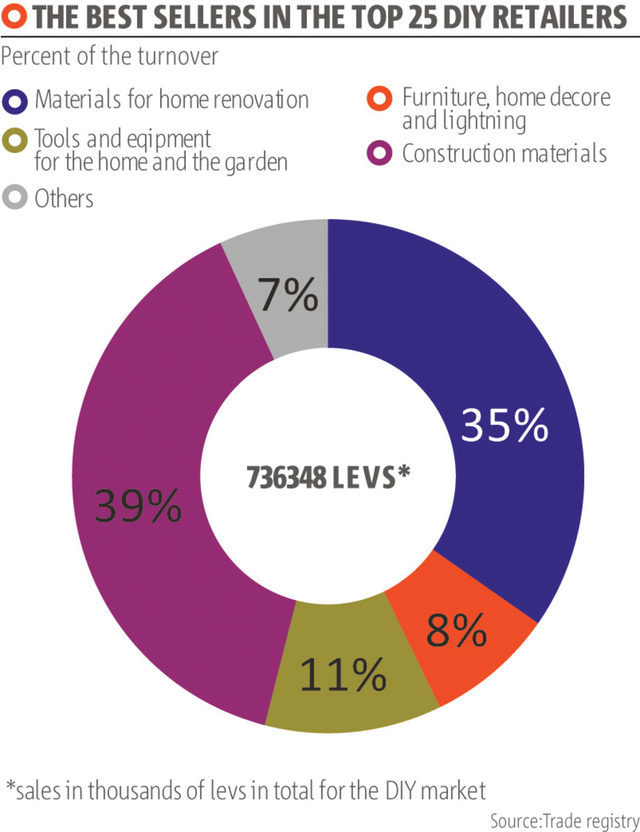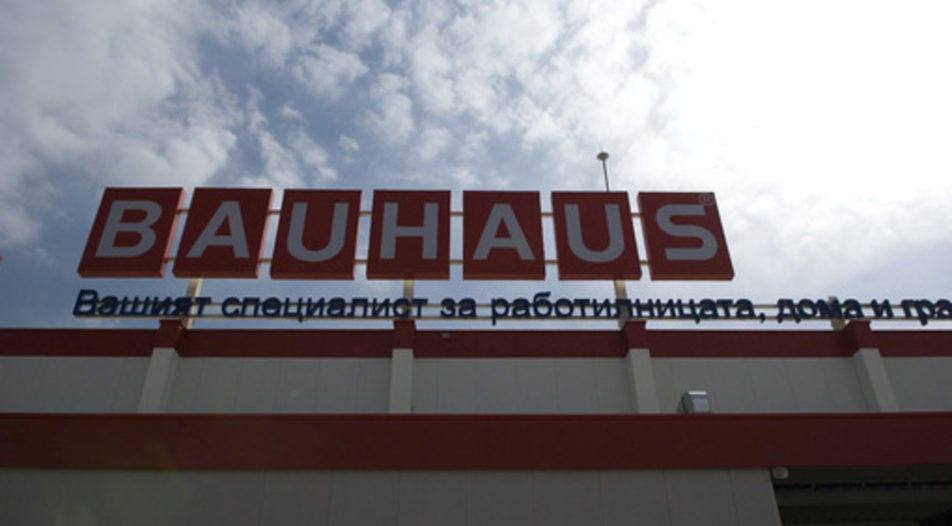During the past five years Bulgarian households increased spending on home improvement and maintenance by around 40%. Retailers of construction materials and Do-it-yourself stores marked sales growth on the back of increased construction of new buildings and house repairs. The revenues of 18 of top 25 companies in the sector rose last year compared to 2015 and 21 of top 25 companies marked an increase compared to 2014. The combined sales of the top 25 group grew 13% year-on-year in 2016.
Three chains with stores in big Bulgarian cities dominate the retail market of construction materials and goods for finishing works. On the other hand, in many regions there are local traders that manage to compete successfully. The difference in turnover is significant: the combined sales of the three biggest companies in the sector equal those of all the rest taken together. Industry data show that all traders but one in the top 25 group in the sector posted profits in 2016. Only the local unit of German home improvement company Bauhaus reported a loss.
The sector also has another specific feature: at present there is only one foreign investor (Bauhaus) in the best-performing group. After the withdrawal of Praktiker and Baumax, their business was acquired by local players.

Praktiker Bulgaria was the biggest DIY company in 2016 with revenues of 113.6 million levs, up 159% year-on-year, which isthe biggest growth rate in the sector. By comparison, in 2014 and 2015 Praktiker Bulgaria registered sales of 34.5 and 89.5 million levs, respectively. The company has recovered since Bulgaria's Videolux Holding, owner of consumer electronics and white goods chain Technopolis, purchased the local business of the insolvent German home improvement store chain in 2014.
Also in 2014, Bulgarian-based Hedus acquired the local business of Baumax from its Austrian owner which also experienced serious financial troubles. New Bulgarian shareholders have joined the company since: the Rodna Zemya Holding company, close to diversified group Chimiport, and Apostol Apostolov, chairman of the supervisory board of Teximbank. The chain was renamed to Home Max and extended considerably its product range as it started offering more goods for home improvement in addition to construction materials, thus offering an overall solution for the house.
Doverie Briko, which runs the Мr. Bricolage stores in Bulgaria under franchise from the French DIY retailer, is also part of the top three group. Mr. Bricolage is the biggest DIY chain in Bulgaria in terms of the number of sites - it has 11 stores in the bigger cities in the country and increased its revenues last year.
Seven companies which have stores and wholesale units for construction materials across the country rank immediately after the top three. They are owned by Bulgarian investors and through the years they have grown their business up to annual volumes of 30 million to 50 million levs. This group includes Angro construction materials exchange (4), Gospodinovi Stroimarket (5), the Boshnakov company with the Masterhaus construction materials hypermarket (6), DS Home (7), Ceramic Group (8), SIKO-S (9), Tashev-Galving (10). All of the above-listed companies, with the exception of Boshnakov, increased their sales last year. The seven companies had a total turnover of 283 million levs in 2016 and an average revenue growth of 7%.
During the past five years Bulgarian households increased spending on home improvement and maintenance by around 40%. Retailers of construction materials and Do-it-yourself stores marked sales growth on the back of increased construction of new buildings and house repairs. The revenues of 18 of top 25 companies in the sector rose last year compared to 2015 and 21 of top 25 companies marked an increase compared to 2014. The combined sales of the top 25 group grew 13% year-on-year in 2016.
Three chains with stores in big Bulgarian cities dominate the retail market of construction materials and goods for finishing works. On the other hand, in many regions there are local traders that manage to compete successfully. The difference in turnover is significant: the combined sales of the three biggest companies in the sector equal those of all the rest taken together. Industry data show that all traders but one in the top 25 group in the sector posted profits in 2016. Only the local unit of German home improvement company Bauhaus reported a loss.












